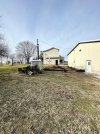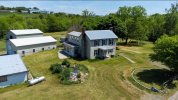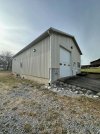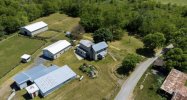djamesgoodwin
Freshman Member
- Joined
- Mar 8, 2024
- Professional Status
- General Public
- State
- New York
Hello all. I’m new here, and have a question about an appraisal. I hope it’s okay to ask.
My wife and I are relocating to Virginia and trying to buy an old farmhouse. The house is on just over 8 acres, near Harrisonburg. It’s not unlike most rural farmhouses. It’s a big pretty farmhouse in a rural area, with outbuildings.
It has a small horse barn, a basic horse riding arena, and most importantly, a 30x50 metal building, with a large garage door, heated with upgraded electric. The owner used it as a workshop for his electrician business, and it has several rooms in it.
The house is 2900 sqft, in good condition, and is zoned A2, which in this part of Virginia, is the most common zoning outside of any town. It is generally rural homes, etc. but could permit commercial with certain conditions.
Closest neighbors are a cattle farm, several homes, and a church.
for deeper context, I am doing a non-QM bank statement mortgage, which as I understand it, limits my pool of lenders, of course. And I've been told that because the lender uses an AMC, it essentially is expecting a normal cost residential form appraisal, and because this is more complex, many won't want to take the job.
Here is what I know:
In Virginia, A2 means :
(a)The predominant land uses in the A-2 district shall be agricultural production and forestry. Agritourism and agribusiness-related support uses shall be permitted in order to supplement farm income.
(b)The A-2 district shall allow more community-scale retail, service, and recreational uses than the A-1 district, primarily through special use permits.
(c) Agricultural and forestal activities shall be regulated only to the extent necessary to protect public health and safety. People who choose to live in this district should expect agricultural and forestal activities to produce noise, odors, and other effects as part of day-to-day operations.
The appraisal management company put out the card and the first residential appraiser came back saying it is commercial in his HBU analysis. The AMC rejected it and put the card back out, and apparently either no CGA has picked it up, and others have just looked up the property and also called it commercial or passed on it. Now they want to do a commercial narrative report on it. I don't really know what that means.
I am frustrated and at a loss for what to do. The house is very clearly a single family residence, where the owner ran his own business, and built that building. But in my mind, it is inconceivable that the property would pass the HBU test as commercial. it isn't big enough to farm, the horse facilities are not advanced enough to be a working horse farm. I suppose one could rent out a stall or two, but that's insignificant income, and also comes with liability. And any owner living in the house would likely not be renting out the building to a third party. No infrastructure for parking, retail, etc. Not to mention, it has always been a residence since 1920. And the county tax card calls it a single family residence in A2 zoning. The guy just built this building so he didn't have to rent a building in town for his business. It seems fairly obvious to me that the building(s) would be considered accessory secondary usage, at best. it looks not unlike hundreds of rural small hobby farms I've seen. Maybe I am missing something here.
One thing I was told by an outside observer, is that it's possible the first appraiser muddied the waters by noting that the real estate agent is a commercial agent, which is true. What I understand is that the agent is a contractor who has worked for the seller for years, and took on the property because of that. I don't know if that influences anything, but it's worth mentioning. He was still selling it as a residence with accessory buildings, but...
What do I do? What can I do? This will kill my mortgage and Im scared that I’m powerless in this.
Am I totally out of options? Thanks for any help you all can offer.
My wife and I are relocating to Virginia and trying to buy an old farmhouse. The house is on just over 8 acres, near Harrisonburg. It’s not unlike most rural farmhouses. It’s a big pretty farmhouse in a rural area, with outbuildings.
It has a small horse barn, a basic horse riding arena, and most importantly, a 30x50 metal building, with a large garage door, heated with upgraded electric. The owner used it as a workshop for his electrician business, and it has several rooms in it.
The house is 2900 sqft, in good condition, and is zoned A2, which in this part of Virginia, is the most common zoning outside of any town. It is generally rural homes, etc. but could permit commercial with certain conditions.
Closest neighbors are a cattle farm, several homes, and a church.
for deeper context, I am doing a non-QM bank statement mortgage, which as I understand it, limits my pool of lenders, of course. And I've been told that because the lender uses an AMC, it essentially is expecting a normal cost residential form appraisal, and because this is more complex, many won't want to take the job.
Here is what I know:
In Virginia, A2 means :
(a)The predominant land uses in the A-2 district shall be agricultural production and forestry. Agritourism and agribusiness-related support uses shall be permitted in order to supplement farm income.
(b)The A-2 district shall allow more community-scale retail, service, and recreational uses than the A-1 district, primarily through special use permits.
(c) Agricultural and forestal activities shall be regulated only to the extent necessary to protect public health and safety. People who choose to live in this district should expect agricultural and forestal activities to produce noise, odors, and other effects as part of day-to-day operations.
The appraisal management company put out the card and the first residential appraiser came back saying it is commercial in his HBU analysis. The AMC rejected it and put the card back out, and apparently either no CGA has picked it up, and others have just looked up the property and also called it commercial or passed on it. Now they want to do a commercial narrative report on it. I don't really know what that means.
I am frustrated and at a loss for what to do. The house is very clearly a single family residence, where the owner ran his own business, and built that building. But in my mind, it is inconceivable that the property would pass the HBU test as commercial. it isn't big enough to farm, the horse facilities are not advanced enough to be a working horse farm. I suppose one could rent out a stall or two, but that's insignificant income, and also comes with liability. And any owner living in the house would likely not be renting out the building to a third party. No infrastructure for parking, retail, etc. Not to mention, it has always been a residence since 1920. And the county tax card calls it a single family residence in A2 zoning. The guy just built this building so he didn't have to rent a building in town for his business. It seems fairly obvious to me that the building(s) would be considered accessory secondary usage, at best. it looks not unlike hundreds of rural small hobby farms I've seen. Maybe I am missing something here.
One thing I was told by an outside observer, is that it's possible the first appraiser muddied the waters by noting that the real estate agent is a commercial agent, which is true. What I understand is that the agent is a contractor who has worked for the seller for years, and took on the property because of that. I don't know if that influences anything, but it's worth mentioning. He was still selling it as a residence with accessory buildings, but...
What do I do? What can I do? This will kill my mortgage and Im scared that I’m powerless in this.
Am I totally out of options? Thanks for any help you all can offer.





